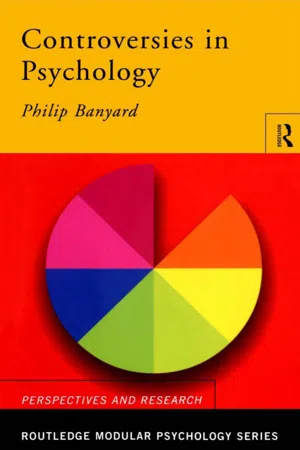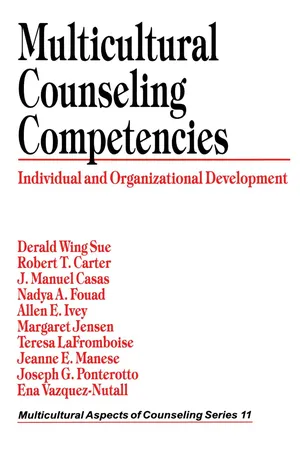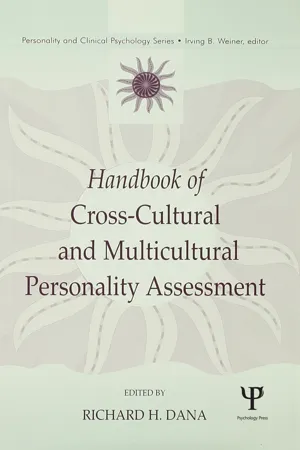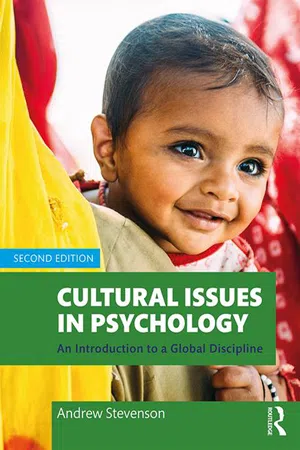Ethnocentrism
Ethnocentrism refers to the tendency to view one's own cultural group as superior to others. It involves judging other cultures based on the standards and values of one's own culture. This can lead to prejudice, discrimination, and a lack of understanding or appreciation for cultural diversity.
8 Key excerpts on "Ethnocentrism"
- eBook - ePub
Cross-Cultural Psychology
Critical Thinking and Contemporary Applications, Sixth Edition
- Eric B. Shiraev, David A. Levy(Authors)
- 2016(Publication Date)
- Routledge(Publisher)
...Hence, indigenous theories, including indigenous psychology, are characterized by the use of conceptions and methodologies associated exclusively with the cultural group under study (Ho, 1998). For psychologists, it is also important to understand that, for centuries, indigenous groups have suffered colonization and conquest by other groups, yet demonstrated a determination to survive with their distinct sovereign identities, despite all odds (Anaya, 2009). Ethnocentrism College students in several countries were asked to draw a map of the world in ten minutes, putting in as much detail as possible. In almost all cases, the students’ own country was drawn disproportionately large (Whittaker & Whittaker, 1972). Perhaps what is most familiar to us tends to be exaggerated. Ethnocentrism is, in a way, an exaggeration. This is the view that supports judgment about other ethnic, national, and cultural groups and events from the observer’s own ethnic, national, or cultural group’s outlook. In psychology, for example, various theories that rely on concepts alien in the studied culture are subject to the pitfalls of Ethnocentrism. For those who grew up in one place and have never been exposed to other countries, the differences between Chile and Argentina, France and England, and blacks and Hispanics in the United States would appear insignificant. Ethnocentrism narrows our perception of other countries and social groups. In that sense, Ethnocentrism is a distortion of reality. In most cases, being ethnocentric is also judging from the position of a cultural majority...
- eBook - ePub
Ethnocentrism
Integrated Perspectives
- Boris Bizumic(Author)
- 2018(Publication Date)
- Routledge(Publisher)
...7 Ethnocentrism in psychology Ludwig Gumplowicz, who introduced the concept of Ethnocentrism in the 1870s, argued that a successful social science must get rid of Ethnocentrism (Gumplowicz, 1895). He was optimistic about this possibility, saying in the 1890s that Ethnocentrism was beginning to decline as a result of progress in the social sciences: “Well, the modern sociology has shone into the face of the ghost of Ethnocentrism – and it begins to wane” (Gumplowicz, 1895, p. 2). Nevertheless, although Ethnocentrism had appeared to wane at one point, it has not disappeared, and writing over 120 years later in the American Psychologist, Hall, Yip, and Zarate (2016) lamented: “those studies that include ethnocultural diversity as a primary aim are often marginalized and directed to specialized journals. From our perspectives as clinical, developmental, and social psychologists, and as journal editors, ethnocentric research approaches that do not make explicit attempts to include diverse samples have dominated the field” (p. 41). These authors also mentioned that topics such as race, ethnicity, and diversity are rarely studied or even ignored in psychology, being mentioned in even less than 4% of the journal articles in top journals, such as Journal of Consulting and Clinical Psychology, Developmental Psychology, and Journal of Personality and Social Psychology, during the last 15 years. Thus, the influence of Ethnocentrism is pervasive, and Ethnocentrism affects not only those whom psychology studies, but also the study of psychology itself. Possibly the only discipline that has taken a strong stand against Ethnocentrism is anthropology – although whether it has freed itself, or could ever free itself, of Ethnocentrism is debatable (Brodkin, 1997; Embree, 1950; van der Geest, 2005)...
- eBook - ePub
- Phil Banyard(Author)
- 2003(Publication Date)
- Routledge(Publisher)
...The early psychological theories of prejudice suggested that it came from childhood experiences and only affected a small minority of people. The theory of the authoritarian personality, for example, put forward by Adorno et al. (1950) described prejudice as a consequence of a failure to resolve childhood conflicts between children and their parents. More recent descriptions of prejudice by, for example Tajfel (1970), suggest that we make prejudiced judgements and actions on the basis of our group membership. This approach would suggest that this ethnocentric bias is an inevitable part of social living. The task for us then becomes to be aware of our ethnocentric bias and try to acknowledge the worth of people who are not in our group. How does Ethnocentrism affect psychology? Ethnocentrism means that we give undue prominence to our own group of people. An analysis of introductory text books by Smith and Bond (1993) found that they mainly cited work by researchers from America. In a fairly standard American text by Baron and Byrne (1991), 94 per cent of the 1,700 studies mentioned were in fact from America. In a British text (Hewstone et al., 1988), about 66 per cent of the studies were American, 32 per cent were European and under 2 per cent came from the rest of the world. These books are by no means exceptional, and they reflect the places where psychological research is conducted. It is estimated by Rosenzweig (cited in Smith and Bond, 1993) that there are 56,000 psychology researchers in the world and about 64 per cent of them are American. So, psychological research is mainly conducted by American and Europeans, and they mainly study themselves. This means that the psychology in our text books is the psychology of Americans and Europeans, but it is by no means clear whether the behaviour these people display is the same behaviour we can expect in other cultures and other lifestyles...
- Jane Jackson(Author)
- 2019(Publication Date)
- Routledge(Publisher)
...Ethnocentric behavior may be characterized by arrogance, vanity, and even contempt for people who do not belong to one’s ingroup. Ethnocentric thinking may cause us to make false assumptions and premature judgments about people who have been socialized in a different cultural environment. When we only draw on our own cultural (and linguistic) norms to evaluate unfamiliar practices (e.g., cultural scripts, sociopragmatic norms, customs, ethics, religious traditions), we are engaging in Othering and behaving in an ethnocentric way. We are ‘assuming that the worldview of one’s own culture is central to all reality’ (M.J. Bennett 1993: 30) and that our ways are the only proper ways to think and behave. Emotional, negative reactions to cultural difference can reduce the willingness to expend the additional energy that may be required to make sense of unfamiliar cultural messages. An ethnocentric, monocultural mindset can hold one back from cultivating healthy intercultural relationships. Ethnocentric tendencies can affect the way we communicate with people who are different from ourselves. Monolingual, monocultural individuals who converse with minority members who are second language speakers may convey a lack of respect or indifference toward their interlocutors through both verbal and nonverbal means. Using a patronizing tone of speech, for example, they may position adult second language learners as young children or adults who lack intelligence and sophistication. Ethnocentric individuals may also make comments that disparage people who they perceive to be from a lesser group or category. For example, they may denigrate people from another region who speak with a different accent...
- eBook - ePub
Multicultural Counseling Competencies
Individual and Organizational Development
- Derald Wing Sue, Robert T. Carter, J. Manuel Casas, Nadya Fouad, Allen E. Ivey, Margaret Jensen, Teresa LaFromboise, Jeanne E. Manese, Joseph G. Ponterotto, Ena Vazquez-Nuttall(Authors)
- 1998(Publication Date)
- SAGE Publications, Inc(Publisher)
...Such changes, however, are believed to pose no problems as long as psychologists adhere to the notion of an unyielding universal psychology that is applicable across all populations. Although few mental health professionals would voice such a belief, in reality, the very policies and practices of mental health delivery systems do reflect such an ethnocentric orientation. The theories of counseling and psychotherapy, the standards used to judge normality-abnormality, and the actual process of mental health practice are culture bound and reflect a monocultural perspective of the helping professions (Highlen, 1994; Katz, 1985; Sue, 1990). As such, they are often culturally inappropriate and antagonistic to the lifestyles and values of minority groups in our society. Indeed, some mental health professionals assert that counseling and psychotherapy may be “handmaidens of the status quo,” (Sue & Sue, 1990) “instruments of oppression,” (Thomas & Sillen, 1972) and “transmitters of society’s values” (Halleck, 1971). We believe that “ethnocentric monoculturalism” is dysfunctional in a pluralistic society like the United States. Ethnocentric monoculturalism combines what Wrenn (1962, 1985) calls “cultural encapsulation” and Jones’s (1972, 1997) description of “cultural racism.” Five primary components can be identified. First, there is a strong belief in the superiority of one group’s cultural heritage (history, values, language, traditions, arts/crafts, and so on). The group norms and values are seen positively and descriptors may include such terms as “more advanced” and “more civilized.” Members of the society may possess conscious and unconscious feelings of superiority and that their way of doing things is the “best way.” Second, there is a belief in the inferiority of all other groups’ cultural heritage, which extends to their customs, values, traditions, and language...
- Richard H. Dana, Richard H. Dana(Authors)
- 2000(Publication Date)
- Routledge(Publisher)
...These incidents, taken singularly, point to discriminatory and insensitive behavior. When considered as a contemporary version of a historical pattern, however, they provide compelling evidence of a pattern of dehumanization that has been thoroughly integrated into the fabric of society and its institutions. Africentricism, as an ideological worldview, is different from Eurocentricism. The Eurocentric perspective is central to traditional (i.e., Western) psychology. It is based on Euro-American cultural norms, values, and philosophical views. It assumes that the Euro-American cultural norms and behavioral standards appropriately define the normative behavior of most people within this country (Akbar, 1984; Baldwin, 1976, 1979, 1985; Nobles, 1976, 1980). Within this perspective, there is an emphasis on control over people and nature, survival of the fittest, competition and aggression, individual achievement, and emotional control. Although the Eurocentric perspective purports to represent cross-cultural thoughts, it does not accomplish such a task. Instead, it projects a negative and pathological picture of non-Westemized cultures and, in particular, the African-American culture (Baldwin, 1979; Nobles, 1980). The Eurocentric perspective makes several assumptions. It assumes that cultural homogeneity exists between Euro-Americans and African Americans. It assumes that any behavioral and value variances that exist between these two cultural groups are the result of slavery and racial discrimination rather than basic cultural differences that can coexist within our society. It assumes that African Americans’ enculturated experiences within this country should eliminate most of the aberrant African cultural traits (Miller & Dreger, 1973; Thomas & Sillen, 1972). As indicated by these assumptions, the Eurocentric perspective minimizes the existence of substantive cultural differences between African Americans and Euro-Americans...
- eBook - ePub
From Instinct to Identity
The Development of Personality
- David Hardison(Author)
- 2017(Publication Date)
- Routledge(Publisher)
...Their own experiences, the customs and practices that they are familiar with, and what history is available to them in oral legends and folklore, comprise the standards by which they judge the world. In our eyes, the customs of neighboring tribes may seem nearly identical. Yet each tribe usually views the other as hopelessly barbaric and totally unlike itself. Most primitive people are extremely ethnocentric; their view of the world is centered on their own, immediate, cultural experience. Modern civilization began to move beyond primitive Ethnocentrism more than two thousand years ago, and today we are aware—if still largely intolerant—of the ways of life and points of view of other social groups and nations. Still, as recently as five hundred years ago it was believed that the earth was the center of the universe. This geocentric view, a more abstract form of the earlier, primitive Ethnocentrism, was challenged and eventually gave way before the findings of Copernicus, Kepler, and the other astronomers of the fifteenth and sixteenth centuries. We now know that the earth is but one planet, rotating around one small star, in one of many galaxies that make up what may be an infinite universe. The special place of man’s world has again been put in perspective. Man’s unique status as an animal—as celebrated in that well-known primitive legend The Book of Genesis, for example—represents another way in which we viewed ourselves at the center of things: in this case at the apex of creation. This form of homocentrism (for want of a better term) was not seriously challenged until the last century. Darwin, by demonstrating man’s place as one species among many and, perhaps even more important, by showing that we have evolved from animal origins and are still evolving and changing, did much to challenge the view of man’s God-given place on earth...
- eBook - ePub
Cultural Issues in Psychology
An Introduction to a Global Discipline
- Andrew Stevenson(Author)
- 2020(Publication Date)
- Routledge(Publisher)
...Distinct though merging phases are decipherable in European philosophical traditions, and an examination of these phases reveals an evolving fascination with people from diverse places. Some aspects of this fascination have distinctly ethnocentric roots. This is unsurprising, as they are grounded in a European view of the world. Many of these ideas emerged when contact across continents was minimal and when communication with those who did venture across the oceans was subject to hearsay, fear of strangers and a distinct lack of methodological sophistication. Sadly, echoes of this Ethnocentrism in European and US writing lingered into the twentieth century (Howitt & Owusu-Bempah, 1995). For now, we’ll concentrate on the historic precursors of research across cultures. Figure 1.1 outlines the philosophical origins of European psychology’s adventures abroad. It also hints at the early exchanges between the thinkers who argued for the universal constancy of the human mind (universalists) and those who stressed the unique manifestation of the mind in diverse cultures (relativists). First moves in the development of cultural anthropology (defined as the study of the complex social structures that make up communities, societies and nations) are also indicated in Figure 1.1. Such disciplines share with psychology an interest in the relationship between culture, experience and behaviour. Figure 1.1 Philosophical roots of psychological research across cultures Key Term Cultural anthropology. The study of the complex social structures that make up communities, societies and nations. Early expeditions The philosophical roots of research across cultures yielded their first large-scale empirical investigation in 1799. The Observateurs de l’Homme was an early attempt to compare different ‘forms of collective life’ (a loose definition for what would later be known as culture) based on objective observations, rather than on unsubstantiated conjecture...







